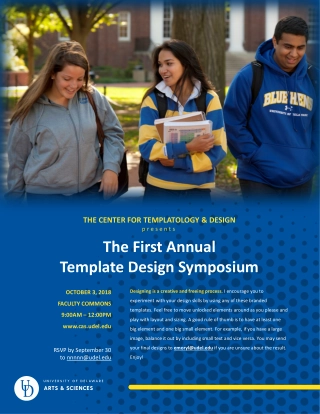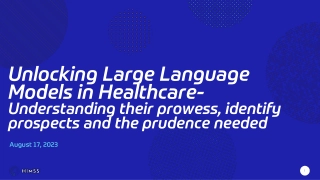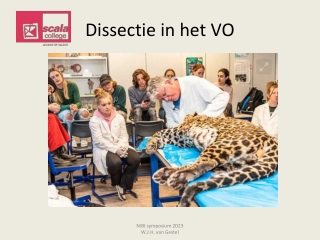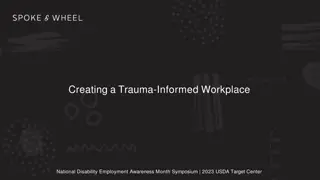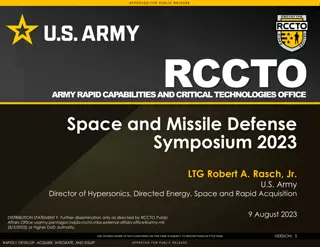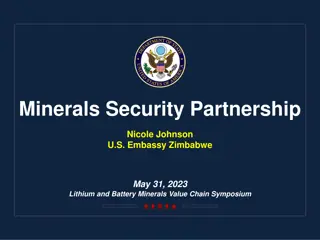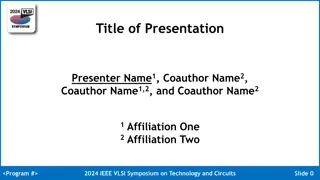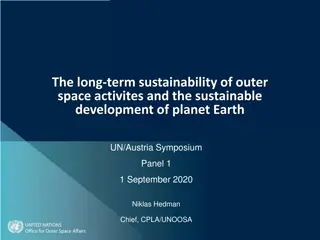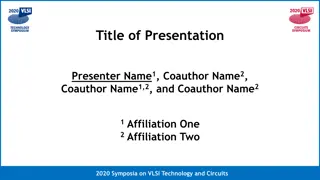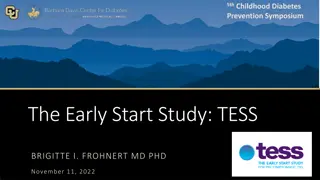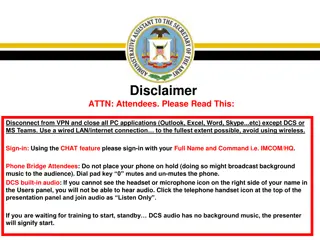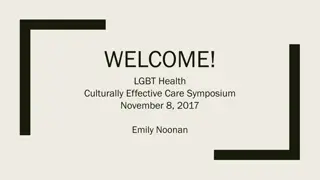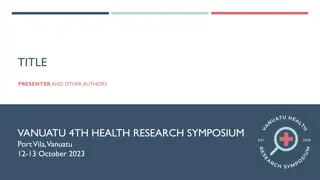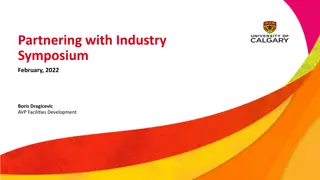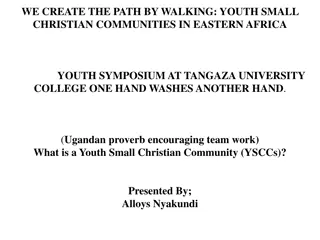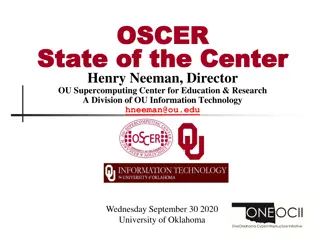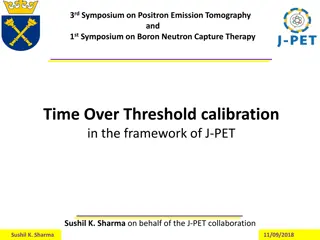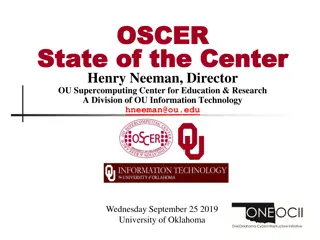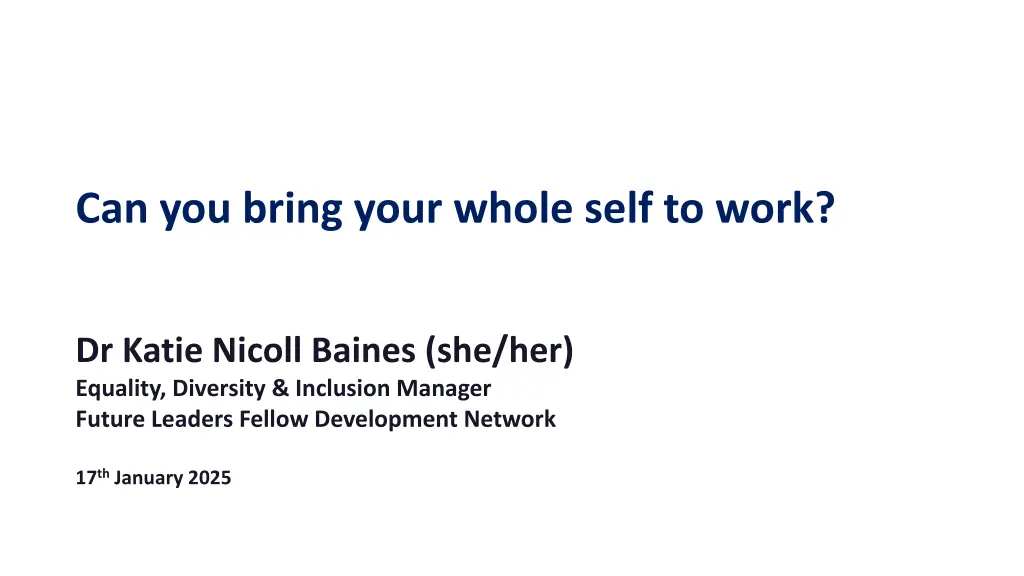
Bringing Your Whole Self to Work: Dr. Katie Nicoll Baines
Dr. Katie Nicoll Baines, an Equality, Diversity, & Inclusion Manager, discusses the importance of bringing your whole self to work. She shares insights on respect, principles, and active participation while highlighting her role in promoting EDI strategies within the Future Leaders Fellow Development Network.
Download Presentation

Please find below an Image/Link to download the presentation.
The content on the website is provided AS IS for your information and personal use only. It may not be sold, licensed, or shared on other websites without obtaining consent from the author. If you encounter any issues during the download, it is possible that the publisher has removed the file from their server.
You are allowed to download the files provided on this website for personal or commercial use, subject to the condition that they are used lawfully. All files are the property of their respective owners.
The content on the website is provided AS IS for your information and personal use only. It may not be sold, licensed, or shared on other websites without obtaining consent from the author.
E N D
Presentation Transcript
Can you bring your whole self to work? Dr Katie Nicoll Baines (she/her) Equality, Diversity & Inclusion Manager Future Leaders Fellow Development Network 17th January 2025
Respect each others contributions Principled spaces guide Chatham house rules apply Actively participate in all aspects of the session Feel free to ask questions at any time
Who am I? Katie is an equality, diversity and inclusion specialist and experienced facilitator/trainer with expertise in researching barriers to career progression experienced by women and LGBT+ people related to grant funding. Katie created and implements our EDI strategy. She is responsible for embedding principles of equality, diversity and inclusion across all network programmes and activities. She supports our training and development team to embed EDI in the leadership training for fellows and develops bespoke training to respond to specific EDI needs within the Network. Katie also works with UKRI on strategies to support Inclusive Research Design.
Self-awareness: identity map Unpredictable caring responsibilities Cisgender Woman White Earn a salary above national average Neurotypical Standard body type (not fat) Bisexual/ queer RP Accent British Distinctly left- wing political beliefs/socially conscious English is my first language Not religious Educated to PhD level Not disabled
Self-awareness: identity map Caring responsibilities Sex Gender identity Race Salary/wealth Neuro-type Body type Nationality Sexuality Accent Political beliefs Language Religion Education Other quirks/skills? Disability
Activity: Folding Paper I regularly see people that look like me represented as leaders in my scientific field One or both of my parents went to University I can choose blemish cover or bandages in flesh colour and have them more less match my skin I can hold hands with my romantic partner in public without fear of experiencing negative comments/glances from other people I didn t need a visa to work/study where I am now When going to a new place I am not concerned about whether I can physically access the space I can go for a walk at night without worrying for my personal safety
Understanding the system Institutions Individuals Funders Community Crisis Government International
Understanding the system LGBT+ people more likely to leave STEM fields (28% compared to 16% non-LGBT+)
Understanding the system Funders Institutions Government
Understanding the system Section 28/Clause 2a Government Equality Act 2010 Gender Recognition Act How many openly LGBT+ leaders in your field do you know? What does a leader in STEM look like?
Understanding your values Review the list of workplace values and select those that are important to you
Work Values Derived from Brian Hopson and Mike Scally, Build Your Own Rainbow: A Workbook for Career and Life Management (2009). Pressure: You like working to deadlines. Community: You like to live in a place where you can get involved in the community. Work with others: You like to work in a team alongside others. Place of work: It is important that you work in the right part of the country for you. Physical challenge: You enjoy doing something that is physically demanding. Peace: You prefer to have few pressures or uncomfortable demands. Work alone: You like to work on your own. Variety: You enjoy having lots of different things to do. Artistic: You enjoy work involving drawing, designing, making music, making Competition: You enjoy competing against other people or groups. models, etc. Independence: You like being able to work in the way you want, without others Communication: You enjoy being able to express ideas well in writing or in speech. telling you what to do. Recognition: You do like people to appreciate you for the work you do. Time freedom: You prefer to be able to choose your own times for doing things, not Security: It is important to know your work will always be there for you. having rigid working hours. Contact with people: You enjoy having a lot of contact with people. Friendship: You would or do like close friendships with people at work. Precise work: You like working at things which involve great care and concentration. Fast pace: You enjoy working rapidly at a high pace. Help society: You like to think that your work is producing something worthwhile for Status: You enjoy being in a position which leads others to respect you. your society. Making decisions: It is important to you to have to make decisions about how things Supervision: You enjoy being responsible for work done by others. should be done, who should do them, and when they should be done. Persuading people: You enjoy persuading people to do something or change their Creativity: Thinking up new ideas and ways of doing things is important to you. minds about something. Risk: You like to take risks. Learning: It is important for you to learn new things. Excitement: It is important to you to have a lot of excitement in your work. Being expert: You like being known as someone with special knowledge or skills.\ Money: Earning a large amount of money is important to you. A well-known organisation: You like being part of a well-known organisation. Helping others: It is important to you to help other people either individually or in Promotion: You like to work where there is a good chance of promotion. groups, as part of your work. Challenge: You enjoy being stretched and given new problems to work on. Routine: You like a work routine which is fairly predictable.
Honouring your values 1. To what extent are your top three values honoured right now, in your current role? 2. Give them each a score x/10 3. If you have a low score, what small thing could increase it by one point? 4. If you have a high score, what (if anything) needs to happen to maintain it 5. To what extent do your colleagues see/hear/feel your values in your words and actions? 6. Could your core values help you to make a choice or decision you are facing?
Understanding bullying & harassment Incidences of bullying & harassment in HEIs 25% of faculty members self-identify as having been bullied* 40-50% say they have witnessed others being bullied* Survey of Irish HEIs shows that minority groups (e.g. LGBTQ+, ethnic minorities, those with a disability) are more likely to endure negative acts at work, bullying & cyber bullying compared to majority group Almost 400 sexual misconduct claims were filed at Scottish Universitiees since 2016 *data from a synthesis of studies (Nature 11 May 2021)
What is bullying? There is no legal definition of bullying. It can be described as unwanted behaviour from a person or group that is either: Offensive, intimidating, malicious or insulting An abuse or misuse of power that undermines, humiliates, or causes physical or emotional harm to someone
Harassment is when bullying or unwanted behaviour is about any of the following protected characteristics under discrimination law: Age Disability Gender reassignment Race Religion or belief Sex Sexual orientation Harassment because of pregnancy or maternity is treated differently and could be direct discrimination What is harassment?
Principles of being an active bystander Someone who safely intervenes to support a person experiencing harm or distress caused by the actions of another person/group. Understand your own personal boundaries.
Direct Action: Directly intervene in a situation. Speak up about the harm. Be firm and clear. Distract: Take an indirect approach to de-escalate the situation. Distracting attention away from the person causing harm to give the person experiencing harm time to move away The 5 Ds of bystander intervention Delay: After the incident is over, check in with the person who was harmed. This is essential because it shows the individual that they are valued. Delay also could mean continuing to educate ourselves about ways to help in future Delegate: Get help from someone else. Scan the situation to assess risk and determine how to best intervene. Then, delegate tasks to others around you. Document: Find ways to make a record of what has happened. E.g. If someone is already intervening and you believe the person causing harm behaviour has escalated, or you think a record of the action would be useful, you can document the situation.
Some example phrases Calling-in I m curious, what was your intention when you said that? How might the impact of your words differ from your intent? How might someone else see this differently/interpret your words/actions? What do you assume to be true about ? Calling-out I need to stop you right there I need to push back against that, I disagree, I don t see it that way I wonder if you ve considered the impact of your words It sounds like your just said is this really what you mean
Activity: scenarios for discussion YOU WILL BE PUT INTO SMALL GROUPS (3-5 PEOPLE) AND GIVEN A SCENARIO TO DISCUSS THINK ABOUT THE WAY IN WHICH YOU MIGHT RESPOND TO THE SITUATION PRESENTED CONSIDER WHICH OF THE 5DS MIGHT BE YOUR PREFERRED OR MOST APPROPRIATE INTERVENTION IF YOU ARE CONSIDERING A DIRECT APPROACH WHEN IS CALLING- IN OR CALLING-OUT MORE EFFECTIVE?
One of your research team members, a postdoc who has been in the group for over 3 years, asks a lot of questions during one of your PhD student s project update talks. They first few questions are clarifying ones that you perceive to be necessary to understand their work properly but then the questions seem to become more pressing. The PhD student is visibly flustered during their talk and appears thrown off by being interrupted by the questions. Example scenarios: Team meeting
Example scenarios: Conference You join a group discussion during one of the break periods at a conference. Everyone is standing around drinking coffee and discussing their childcare commitments. The group is composed of an equal number of men and women in addition to you. While talking about the impacts of parental leave on career prospects, one of the men says, But it's ultimately a woman's choice if she wants to take time away so it's only fair that it impact her opportunities for promotion."
You have a well-respected colleague who you have met in person a few times at conferences. You have followed their research and respect their scholarship, and have recently followed them on Twitter. Today, they have tweeted reacting to the CRUK Black Leaders in Cancer PhD Programme, criticizing this initiative for creating inequalities for white working class candidates. Example scenarios: Online space
Example scenarios: Job interview panel discussion You are sitting on a recruitment panel to appoint a new technician to your team.You are joined on the panel by your Head of School, an HR manager and another senior researcher from your team. As part of their applications the candidates were invited to submit a CV and cover letter. None of the candidates mentioned their publication history during the course of their interview and there wasn't a specific question on this subject asked by the panel. While the panel is drawing up the shortlist, the HoS mentions that they had googled one of the candidates and discovered a rich publication history. The HoS argues that this makes the candidate a stronger applicant for the role.
Example scenarios: Industry awards dinner You have shortlisted for an award and the ceremony is taking place at a 5-star London hotel. The dress code is black tie. You decide to ask one of your postdocs to join you as your partner is unavailable. At the reception there is an open bar, and it seems like the other guests are drinking heavily. You are aware that your postdoc doesn't drink.

